| History - 49th A.I.B. - Company 'B' |
 | Index
|
| Index
| | Next |
| Next |
|
(Pages 13-16)
|
Men left on pass for London, but evidently visited a place called Piccadilly instead. For the talk was mostly of that place, and of some of the interesting times they had with a brigade of Commandos who seemed to be stationed there. Such little reminders of home as the monumental chows served in honor of Thanksgiving and Christmas, with turkey and all the fixings, and the letters and packages that finally began to swell the mall bags, were very welcome indeed. On Christmas we played host to several orphans, and everybody tried to outdo everybody else In showering gifts and attentions on these kids. New Years was one of the quietest on record for most of us, as the local brew was more conducive to active kidneys than high spirits, and preparations were going forward for moving out. Our pay coming in Francs had convinced the most doubtful of us.
2 January, 1945
The vehicles left for Southampton, where they were loaded on to LST's and set sail for France. They sailed up the Seine River to Rouen, where they unloaded. The men who accompanied these vehicles across the channel are still raving about the comfortable quarters and good food they received while guests of the Navy. At least those who were spared seasickness raved about the chow.
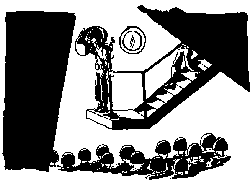
3 January
We left Tidworth and England for good
|
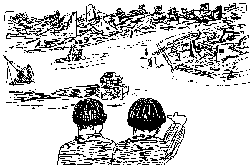
this morning, before dawn as usual, and repeating approximately the procedure we followed at POE New York. We loaded onto trucks, were driven to the station, entrained, rode back to Southampton, staggered five or six blocks to the docks, clutching bedrolls and packs in our arms, climbed the gangplank again. On this ship, a Polish vessel named the 'S. S. Sobieski', we were stowed down in the hold, somewhere below the water line we suspected. The 'Sobieski', although smaller than the 'Samaria', at least gave the impression of being built in the present century. When night came, we brought out the hammocks, and so wore ourselves out mastering the intricacies of this tricky bedding that we fell asleep almost immediately. Some of us gave up altogether, and slept on the floor, where our only worries were men stepping on us en route to the latrine.
5 January
Early in the evening we steamed into the port of Le Havre, one of the biggest ports In Europe, and one of the most demolished. 'Damn, you'd think there'd been a war around here!', muttered one gaping railbird, surveying the sunken ships and demolished docks. We disembarked after dark, from the side of the ship into an awaiting LCT, which ran us up on the shore in true invasion fashion, and we hit the beach, looking nervously over our shoulders
|
-- 13 --
|
for lurking. Messerschmidts. We loaded onto trucks this time, no trains being available, and drove some sixty or seventy miles through the cold and snow, arriving frozen and tired in the little French town of Anglesqueville, near Totes, about 0100 next morning.
6 -7 January
We made the most of our opportunity to get acquainted with the French. Phrase book in hand we went determinedly after the population, and soon large dusters of GIs were seen around tolerantly amused little kids, asking any sort of question they could think of. For the most part the kids waited until the boys were just about talked out, and then asked for 'Chocolate, chewing gum, or cigarette pour papa.' Others didn't wait for them to talk themselves out. No matter how the conversation started, It always ended with the request for cigarettes and chocolate. In an alley down the street a still was found that transformed apple juice into a product for which many uses were found, including lighter fluid. And the 'Vive la France!' sentiment gained in intensity. Our vocabulary was soon increased by such valuable terms as 'Cognac, Calvados. No compree, Couchez avec moi, etc,'. It was here that the GI bedroll, to use the less descriptive term, was issued, and where the vehicles rejoined us.
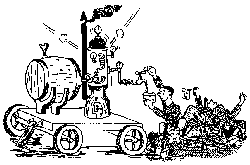
|
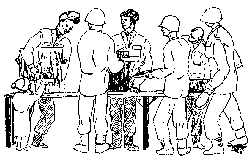
8 January
At an early hour, even for B Co., we loaded everything into the tracks and pulled out. It was really cold, and we had one of our first experiences of just how miserable you can get riding in a half track all day. We rode and froze until about 21 hours that night, through Compaigne, Soissons, and Reims, ending up in some woods near, (they tell us) Baccones, France, about thirty miles east of Reims.
11 January
At about 2300 hours, Thatcher, our bugle boy, was roughly awakened by Captain Smith, yanked from his tent, handed his bugle, and told, "Blow that thing boy, you 'know what to blow'. Standing ankle deep in snow and clad in Shorts and goose-pimples, he blew 'Call to Arms', scaring the daylights out of several doughboys who had a hazy impression that we were being attacked or something. Once we were out of our blankets, and organized to some extent, the work of getting loaded and rolling went forward. Ammunition came up, and was stowed; bedrolls were thrown aboard in a haphazard manner, and secured with a prayer; the hay we had been using for bedding went up in a blazing column, throwing an eerie light on the scurrying men; and in general the scene resembled a movie version of the Battle of Gettysburg. When everything was ready we were told that we would move out in an
|
-- 14 --
|
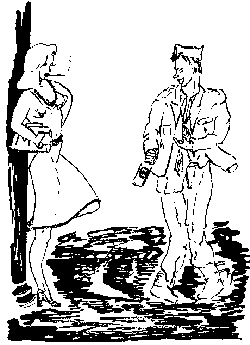
hour or two, so we sat around burning ammunition boxes to keep warm. Finally we moved out and drove all that day and the next night arriving at Louvigny, near Metz, about noon of 13 January. It was a long, cold 110 miles, and we were more than glad to stop, even in such a town as Louvigny, which was somewhat the worse for War.
13 January - 2 February
We stayed at Louvigny for about three weeks, enjoying near zero weather all the time, and preparing for combat. During this time our helmets we~ all painted white, and the tracks underwent a similar transformation. The 'camouflage' was so good that Minton claimed he lost his track for two days and never would have found it if he hadn't stumbled over it in the motor pool. We set up outposts, and when strong German counter-attacks were threatened around Saarbrucken, we were called out on the alert, with double guards, and ugly rumors about paratroopers in the area. Meanwhile we trained, running tank -- infantry problems with B Co. of the 36th Tanks.
It was here that tragedy overtook us, when Pfc. Fredrick Pardridge was killed by an enemy mine on 16 January. T/5 George Weilbacher was injured by the same
|
was injured by the same explosion, but returned to us later. Training was becoming more realistic with the use of Jive ammunition and explosive charges. It was during one of the lectures on demolitions that three men were slightly injured, but all of them returned to the company later. On a few occasions trips were taken into Metz where a quartermaster outfit was dispensing showers and clean underwear, and on several occasions we prepared to move out into battle.
But they were dry runs. Towards the end of our stay here the long awaited winter equipment arrived, shoepacs, and heavy gloves. It promptly got warm, and the snow began to melt. The greater part of our time here was spent. huddling around a stove, and dreaming of our nice warm Louisiana with it's dust and Its blistering sun, and it's nice warm showers. How we wished we were back there!
2 February
We packed up and moved out of Louvigny at 1300, and started a long trek across Northern France; through Luxembourg, which we crossed in about a half an hour sometime in the night; through Belgium and liege, where everyone waved and threw apples at us, and offered us coffee when we stopped; on up into Holland, where we stopped at last, on the outskirts of Valkenburg, near Sibbe. We landed in Valkenburg at about 1500, 3 February. Here we spent the night sleeping in one
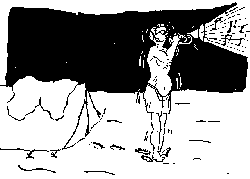
|
-- 15 --
|
of the monstrous caves that honeycomb the hills around the town. The next day we moved into the houses along with the civilians who seemed to be very glad to have us there, and did everything they could to make us comfortable.
Here, for the first time since England, we found a place where at least a fairly decent percentage of the populous spoke English. We took advantage of this, and had many talks with the people, during which we learned from first hand reports of the German occupation and of the great Dutch Underground.
From Valkenburg the company commanders and platoon leaders of the battalion went 'up front' for the first time. They went up to our proposed area around Kempen, Holland, as observers. It was then, also that Richter had the elite honor of being the first enlisted man to go 'up front'. During the days that followed, several patrols were sent up tbere to gather information.
We spent most of our time preparing for combat and sweating out alerts which turned out to be 'dry runs'. On three successive days we prepared to move up, and on three successive days the movement was postponed at the last minute.
This last minute letdown was a strain on the nervous system, but somewhat of a relief when we got to thinking it over, and
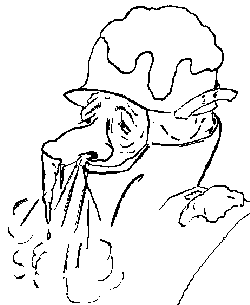
|
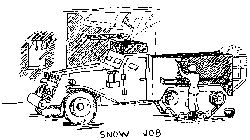
as Zubovitz said, '1 don't care If they postpone this movement for the duration'. It was here that we lost Joe Davis, when he was hit by a truck and suffered a broken leg, and Lt. Cushman, who was transferred to the 7th Infantry Battalion, much to the regret of his platoon. To make up for the slump in the T/O we received 17 replacements to bring the company up to strength.
21 February
We arose at 0330 and moved out, the real thing this time. We traveled north to Posterholt, Holland, where we were to take up defensive positions along the Roer River, and relieve the British 7th Armored Division. We arrived about noon, and spent the afternoon sitting around, comparing equipment, and talking with some of the British whose outfit we were to relieve. Then at 1730, after eating chow, the first and second platoons moved out to take up their positions, while the third platoon remained in Posterholt in reserve, and the AT platoon was placed in battalion reserve.
The first platoon drew for their positions, a little cluster of houses known as Paarlo, while the second platoon drew another little cluster of houses known as Holst. Our mission was to guard against enemy patrols and to generally hold the line. This was our first night in the line, and consequently we were a little nervous. A great deal of livestock almost lost their lives through being mistaken for enemy patrols! It was cold, too, and the men on guard fluctuated between a state of apprehension and freezing, but with morning, the vigil relaxed, and hot chow came up.
|
-- 16 --
|